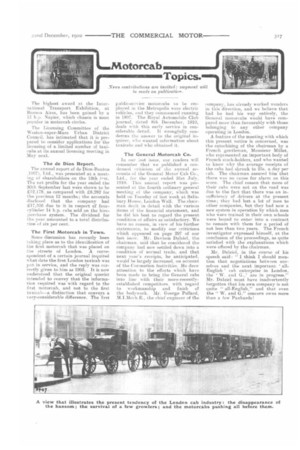The highest award at the International Transport Exhibition, at Buenos
Page 3

If you've noticed an error in this article please click here to report it so we can fix it.
Aires, has been gained by a 15 h.p. Napier, which chassis is most popular in motorcab circles.
The Licensing Committee of the Weston-super-Mare Urban District, Council, has intimated that it is prepared to consider applications for the licensing of a limited number of taxicabs at its annual licensing meeting in May next.
The de Dion Report.
The annual report of de Dion-Bouton ,1907). Ltd., was presented at a meeting of shareholders on the 13th i-st. The net profits for the year ended the 30th September last were shown to be L12,178. as compared with 1:8,282 for the previous 12 months; the accounts disclosed that the company had 17,506 due to it in respect of fourcylinder 14 h.p. cabs sold on the hirepurchase system. The dividend for the year amounted to a total distribution of six per cent.
The First Motorcab in Town.
Some discussion has recently been taking place as to the identification of the first motorcab that was placed on the streets of London. A correspondent of a certain journal inquired wliat date the first London taxicab was put in service, and the reply was correctly given to him as 1903. It is now understood that the original querist intended to convey that the information required was with regard to the first motorcab, and not to the first taxicab—a distinction that conveys a very-considerable difference. The first public-service motorcabs to be employed in the Metropolis were electric vehicles, and they commenced running in 1897. The Royal Automobile Club journal, dated 8th December, 1910, deals with this early service in considerable detail. Tt wrongfully condemns the answer to the original inquirer, till() wanted information about taxicalJN and who obtained it.
The General Motorcab Co.
In our last issue, our readers will remember that we published a condensed ■.!riticism of the annual accounts of the General Motor Cab Co., Ltd., for the year ended 31st July, 1910. This annual report was presented at the fourth ordinary general meeting of the company, which was held on Tuesday of last week at Salisbury Nouse-, London Wall. The chairmandealt in detail with the various items of the financial statement, and he did his best to regard the present condition of affairs as satisfactory. We have no reason, in view of his further statements, to modify our criticisms which appeared on page 297 of our last issue. Mr. Davison Dalziel, the chairman, said that he considered the company had now settled down into a condition of normal trade, and that next year's receipts, he anticipated, would be largely increased, on account of the Coronation festivities. Be drew attention to the efforts which have been made to bring the General cabs into line with their more-recentlyestablished competitors, with regard to workmanship and finish of the bodywork. Mr. George Pollard, M.I.Mech.E., the chief engineer of the company, has already worked wonders in this direction, and we believe that had he had his way entirely, the General motorcabs would have compared more than favourably with those belonging to any other company operating in London.
A feature of the meeting with which this present notice is concerned, was the catechising of the chairman by a French gentleman, Monsieur Millet-, who represented an important body of French stock-holders, and who wanted to know why the average receipts of the cabs had shrunk to 25s. a day per cab. The chairman. assured him that there was no cause for alarm on this score. The chief reason that more of their cabs were not on the road was due to the fact that there was an insufficiency of drivers at the present time; they had lost a lot of men to other companies, hut they had now a new system in operation by which men who were trained in their own seltools were bound to enter into a contract to remain with them for a period of not less than two years. The French investigator expressed himself, at the conclusion of the proceedings, as quite satisfied with the explanations which were offered by the chairman.
Mr. Dalziel, in the course of his speech said : " I think I should mention that negotiations between ourselves and the next important allEnglish ' cab enterprise in London, the W. and G.,' are in progress." Mr. Dalziel must have inadvertently forgotten that his own company is not quite " all-English," and that even the " W. and G." concern owns more than a few Panhards!


















